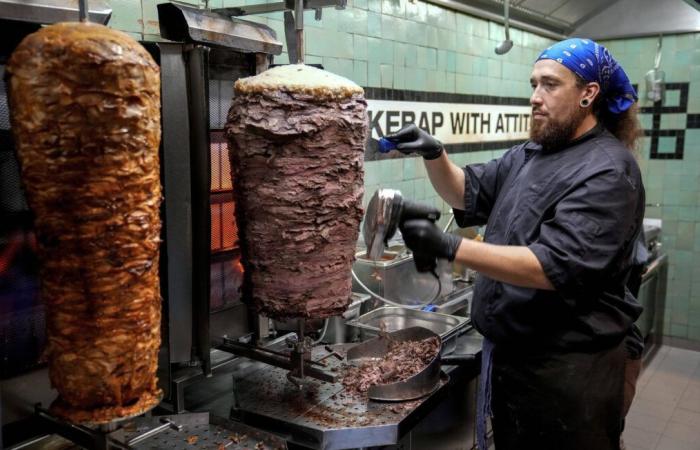For average consumers As we are, the main dilemma of a kebab is choosing between Algerian sauce and samurai sauce. But the dish can be the source of much bigger problems. For several months, Germany and Turkey have been arguing over the sustainability of the döner, and Berlin is determined to take the matter to the European Commission. The latter, which still has two or three more important files on the fire, has left another six months to the two belligerents to find an agreement between them. Not sure, however, that half a year more will be enough to resolve this gastropolitical conflict.
It all started with an XXL diplomatic flop when in April, the German president, Frank-Walter Steinmeier, went to Turkey with, among other gifts… 60 kg of kebab meat. The stock was cooked by a Turkish restaurateur living in Germany and served at the official reception in Istanbul. In sandwich form – either the version Deutschland.
The intention was laudable: “to show the symbol of hybridization between the two Nations, but also to present a Germany more open to other cultures and to its integration”, recalls Hélène Miard Delacroix, professor at the University of Sorbonne and specialist in Germanic country. But the idea goes down badly: “Turkey took this as an offense, just like the Turkish-Germans, recalling that immigration brought Germany not only a dish, but also intellectuals, professors… »
The symbolism of a kebab
Annoyed, Ankara asks the European Commission that the doner kebab be protected by the status of a “guaranteed traditional specialty”, like Neapolitan pizza or Serrano ham from Spain. Or the culinary level just below the AOP – controlled designation of origin. On July 24, Germany vetoed the decision. A little excessive? Elisa Goudin, lecturer and specialist in Germany, contextualizes: “The kebab is a pretext as the two countries are in tension over other more important issues – human rights, the reception of refugees, the 'immigration – without being able to show too strong hostility'. Hélène Miard Delacroix adds: “The Turks in Germany are at the heart of the central question of successful or unsuccessful integration: 4.5 million Germans have Turkish origins. There is a special relationship between these two peoples, a bit like the French and the Algerians. »
Even without all these considerations, the kebab is already a symbol in itself, explains Elisa Goudin. In Germany, it is consumed more than McDonald's and Burger King combined. The doner market in Europe is worth 3.5 billion euros, including 2.4 billion for our Germanic neighbors alone.. No need to beat around the bush: “More kebabs are eaten in Germany than in Türkiye,” says Hélène Miard Delacroix.
An economic issue above all
More than this war of stomachs, the kebab therefore represents a whole economic sector across the Rhine. And if the European Commission agrees with Turkey, this could amount to billions of euros for Germany. Indeed, in the case of a “guaranteed traditional specialty” label, the kebab must be cooked according to extremely strict rules: pieces of meat cut between 3 and 5 millimeters thick very precisely, and chiseled with a 55 centimeter knife, no less (yes yes), be cooked in specific quantities of onions, fat, yogurt, beef of at least 16 months, the ban on using veal or turkey – very common meats in Germany… Consequence for Elisa Goudin: “Many businesses will have to close or change their name.”
Change your name? Out of the question for Berlin, which makes it a question of honor and culture. “Germany does not have a strong gastronomy or a typical national dish like France,” notes Hélène Miard Delacroix, brushing aside the idea of sauerkraut, typical only of Bavaria. “On the contrary, the country boasts of having imported world cuisines and of adapting them according to its desires and freedoms. » The Federal Minister of Food and Agriculture, Cem Özdemir – of Turkish origin, you can't make it up – declared: “The döner is German. The diversity of its preparation methods reflects the diversity of our country, a reality that must be preserved. »
Identity withdrawal around food
This conflict loaded with totems is set to last, especially “as neither country is really in the wrong,” continues Elisa Goudin. Yes, the kebab comes from Türkiye, but the recipe as we all know it was invented in Berlin by immigrants in the 1970s. Clémentine Hugol-Bential, professor and specialist in contemporary food issues at the University of Burgundy, sees a general trend: “We find an identity withdrawal around “food, with many diplomatic wars over affiliations”, citing the cases of couscous between the different Maghreb nations and Hummus, where eight countries are candidates (Lebanon, Israel, Palestine, Greece, Turkey – them again -, Jordan , Egypt, Syria). “Food is now seen as exclusionary: it’s ours, not theirs. »
But the professor also wants to be reassuring: “We cannot patent a recipe, make it intellectual property or impose its ingredients. There will always be as many ways to make a kebab as there are cooks”, no matter if the German-Turkish conflict lasts until the Greek calendars. By the way, what does Athens think of this whole story?






